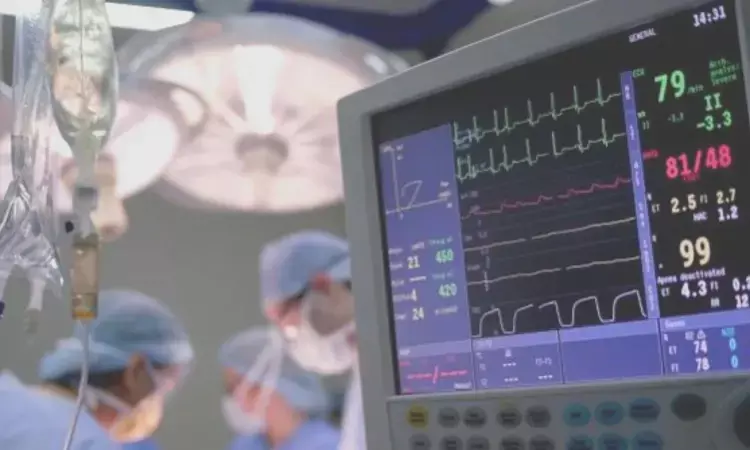- Home
- Medical news & Guidelines
- Anesthesiology
- Cardiology and CTVS
- Critical Care
- Dentistry
- Dermatology
- Diabetes and Endocrinology
- ENT
- Gastroenterology
- Medicine
- Nephrology
- Neurology
- Obstretics-Gynaecology
- Oncology
- Ophthalmology
- Orthopaedics
- Pediatrics-Neonatology
- Psychiatry
- Pulmonology
- Radiology
- Surgery
- Urology
- Laboratory Medicine
- Diet
- Nursing
- Paramedical
- Physiotherapy
- Health news
- Fact Check
- Bone Health Fact Check
- Brain Health Fact Check
- Cancer Related Fact Check
- Child Care Fact Check
- Dental and oral health fact check
- Diabetes and metabolic health fact check
- Diet and Nutrition Fact Check
- Eye and ENT Care Fact Check
- Fitness fact check
- Gut health fact check
- Heart health fact check
- Kidney health fact check
- Medical education fact check
- Men's health fact check
- Respiratory fact check
- Skin and hair care fact check
- Vaccine and Immunization fact check
- Women's health fact check
- AYUSH
- State News
- Andaman and Nicobar Islands
- Andhra Pradesh
- Arunachal Pradesh
- Assam
- Bihar
- Chandigarh
- Chattisgarh
- Dadra and Nagar Haveli
- Daman and Diu
- Delhi
- Goa
- Gujarat
- Haryana
- Himachal Pradesh
- Jammu & Kashmir
- Jharkhand
- Karnataka
- Kerala
- Ladakh
- Lakshadweep
- Madhya Pradesh
- Maharashtra
- Manipur
- Meghalaya
- Mizoram
- Nagaland
- Odisha
- Puducherry
- Punjab
- Rajasthan
- Sikkim
- Tamil Nadu
- Telangana
- Tripura
- Uttar Pradesh
- Uttrakhand
- West Bengal
- Medical Education
- Industry
Hybrid coronary revascularization yields similar outcomes as CABG at 5 years in multivessel disease patients

USA: Findings from a meta-analysis indicate that hybrid coronary revascularization (HCR) is a safe and feasible treatment of multivessel coronary artery disease (MVCAD). The study, published in Catheterization & Cardiovascular Interventions, compared the outcomes of HCR with conventional coronary artery bypass grafting (CABG) in MVCAD.
The study showed that in patients with multivessel disease, hybrid coronary revascularization, compared with CABG, is associated with similar rates of all-cause mortality and adverse events at five years.
The researchers, however, caution that while selecting patients benefits of HCR should be carefully monitored against the increased long-term risk of repeat revascularization.
Hybrid coronary revascularization has emerged as an alternative to CABG in MVCAD patients. HCR can lead to faster postoperative recovery, lower resource utilization, and fewer complications.
Sanjana Nagraj and colleagues systematically searched electronic databases up to December 2021. The meta-analysis included studies comparing HCR with CABG in MVCAD treatment. The prevalence of major adverse cardiac and cerebral events (MACCE) and 5-year mortality were determined (primary outcomes of interest).
Fourteen studies (2 randomized controlled trials and 12 observational studies) of 4226 patients were included.
The study led to the following findings:
- The researchers found rates of 5-year mortality (odds ratios [OR]: 1.55) and long-term MACCE (OR: 0.97) to be similar between CABG and CABG, and HCR groups.
- HCR was linked with a significantly lower probability of perioperative blood transfusion (OR: 0.36), shorter mean hospital stay (weighted mean difference: −2.04), and risk of postoperative acute kidney injury (OR: 0.45).
- CABG showed a lower chance of needing long-term repeat revascularization (OR: 1.51) over a follow-up period of 29.14 ± 21.75 months.
"The study showed that HCR is safe and feasible for treating multivessel coronary artery disease," the authors wrote. "However, the benefits of HCR should be vigilantly weighed against the increased risk of long-term repeat revascularization in patients selection. Further studies must assess differences in long-term mortality between CABG and HCR."
About Hybrid Coronary Revascularization
Hybrid coronary revascularization combines minimally invasive surgical CABG of the left anterior descending artery with PCI (percutaneous coronary intervention) of non–left anterior descending vessels. The procedure is increasingly used for treating MVCAD, characterized by stenoses in the proximal left anterior descending artery and at least one other vessel. Still, there has been no rigorous evaluation of its effectiveness.
Reference:
The study titled "Hybrid coronary revascularization (HCR) versus coronary artery bypass grafting (CABG) in multivessel coronary artery disease (MVCAD): A meta-analysis of 14 studies comprising 4226 patients" was published in Catheterization & Cardiovascular Interventions.
Dr Kamal Kant Kohli-MBBS, DTCD- a chest specialist with more than 30 years of practice and a flair for writing clinical articles, Dr Kamal Kant Kohli joined Medical Dialogues as a Chief Editor of Medical News. Besides writing articles, as an editor, he proofreads and verifies all the medical content published on Medical Dialogues including those coming from journals, studies,medical conferences,guidelines etc. Email: drkohli@medicaldialogues.in. Contact no. 011-43720751


